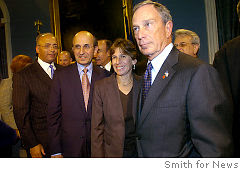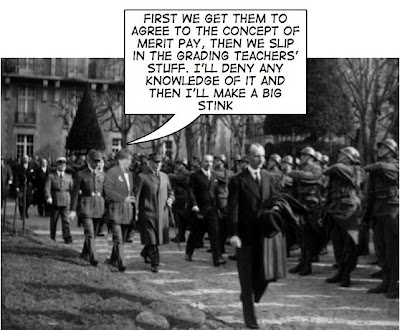 UPDATED April 2
UPDATED April 2The message below was sent from Teachers Advocacy Group (TAGNYC). They blame Weingarten, perhaps not realizing the longstanding position of the UFT regarding people branded fairly or unfairly as "bad" teachers. The UFT has always been concerned about being seen as protecting teachers who have been labeled as "poor" for fear of negative publicity. The Richard Kahlenberg Shaker bio reports that as far back as the 1969 contract, "...a provision for the development of objective criteria of professional accountability" was agreed to by Shanker, who said, "those who can't be improved and who are functioning at a very poor level [what are the criteria?], we're going to have to have the courage to sat that...you may be good at some other thing, but you're not good at this."
Notice the use of the word "we're." Who, me kimosabe? All in the name of what I consider a phony professionalism. Don't get me wrong. Under proper conditions, teachers could play such a role and I would be all for teachers making these decisions - if they had control of the school environment. (I'll get into what I mean by this in a future post.) But they don't. Therefore, the union's job is to defend every teacher rigorously and leave it to some other agency to take care of incompetent teachers. I would favor a body independent of the DOE and the UFT.
Again from Kahlenberg (p. 288): Peer review was common among professors, doctors, and lawyers, who police themselves.Shanker said: "it would be the first time in the history of American education that teaches would govern themselves."
How does Shanker equate peer review of teachers with these professions, which have a higher level of control than teachers ever could have? And by the way, how many doctors have you heard of being "peer reviewed" out of the profession? In the early 80's Shanker said, "a lot of people who have been hired as teachers are basically not competent." Shanker was selling peer review as an alternative to threats to abolish tenure.
The "bad teacher and the unions that protect them is the cause of all the ills of urban public ed" argument is a bogus one. How do you explain the achievement levels in right to work states like Florida where unions have so much less control?
How about your own education experience? Think of your own teachers. How many extraordinary teachers did you have? How many horrors? How inspired or damaged were you by either end of the scale of teacher quality? Somehow many of us survived the bad teachers. I saw some kids in my school have one excellent teacher after another and those that would do well did and those that wouldn't do well didn't.
Teachers guts and experience tell them this is all a crock. Some young teachers just starting out see some impact in the early years. It took me about a decade to see the long-term results as kids started drifting back as they grew up. That's how you get some perspective.
The public seems in much more danger from incompetent police, doctors, lawyers and politicians (see one George Bush) than from incompetent teachers - the worst of whom are often driven out of teaching by the daily failure of facing kids' scorn. Or they just go into administration and abuse teachers who actually can do the job.
Though at times it may make your skin crawl, I recommend reading the Kahlenberg 400 page apology for Shanker's actions. That Al Shanker and the AFT have been promoting this claptrap surprises even veteran NYC teachers. Weingarten is just following a script laid out a long time ago.
Anyway, here's the message from TAG.
Weingarten: Failed Labor Leader
Randi Weingarten is looking to her new career as head of the AFT. That much larger pool of teachers must understand what they are getting. A failed labor leader. Randi, through her position, is in an excellent position to advocate for children and to negotiate health and welfare benefits for her membership. How well she performs either of these two functions demands future critical evaluation. What we address here is her inability to function as a labor leader. Make no mistake. Teachers are members of the labor force. We are not independent contractors or consultants able to individually control our own terms and conditions of employment. And the most important condition of employment is the right to remain employed. Remain in the profession we chose. Ms. Weingarten does not want to be seen as the protector of teachers' job rights: The press and the public would label her a "protector of incompetents." But the teachers who are being forced out of their jobs- the ATRs, the whistle-blowers, the questioners, the teachers who dared to exercise their transfer rights, and the teachers who make too much money - are not incompetents. These teachers are the scapegoats being used to further Bloomberg, Klein, and yes, Randi Weingarten's political ambitions.
Weingarten has proven she does not have the stomach to advocate for teachers' rights to their jobs. She has colluded in turning NYC teachers into at-will employees. Her defense for doing so- "The UFT was not strong enough to fight."
Questions TAGNYC has for Randi Weingarten:
1. Why did you not educate your membership about the implications of the givebacks in the 2005 contract? You and your lawyers knew the possible if not probable consequences. You can't blame the membership for running to take the money since you did not do your job in educating the membership. Labor leaders don't invoke the adage "Buyer beware" when the `buyer' is the membership.
2. Will you admit that you feared for the careers of the more senior teachers in the wake of the 2005 contract and the empowerment of principals? Will you admit that you communicated this fear to your district reps? You hoped Bloomberg-Klein would go easy on the senior teachers. You lost and we lost. Labor leaders should never "depend upon the kindness of strangers."
3. Why did you not rally the members to make a stand against Bloomberg-Klein? 80,000 plus teachers in your corner and you did nothing to get them on the street (strikes weren't necessary- why not mass protests during rush hours, etc)? Oh, right, you were and are afraid of antagonizing the public. Too cautious to be a labor leader.
4. Why do you tell your members "Wait until 2009?" You see 2009 as a time when friends of `labor' come back into office. How courageous! Who can't `lead' when times are good and ears are sympathetic. You failed to lead in tough times. Too many of NYC teachers- the competent teachers- have, and are suffering the devastating consequences of your failed leadership in the run-up to 2009. Will many of these teachers be employed in 2009?
5. Why do you hide behind the 3020a process? Rather than using the law as the pretext for not intervening, why are you not railing against the farce of the 3020a process?
6. Why don't you state publicly what is said privately by district reps, chapter chair people, and OSI: Frivolous charges of incompetence, verbal, corporal, and sexual abuse are being used by principals to remove competent teachers from their schools?
7. Why have you not led your members in vocal, body-on-the line protests against the absurdity of turning competent teachers into ATRs? Why won't you admit loudly and publicly that the ATR paradigm is the road to unemployment for high salaried, competent teachers?
8. Why have you not led your members in vocal, body-on-the-line protests against the willful destruction of competent teachers' careers by incompetent, insecure, and unethical principals?
9. Who is defending your teachers in the schools? Do you know that most of your chapter chair people and district reps have abdicated the duty to advocate? Do you know of the despair being felt by teachers who know they don't have a union willing or able to defend them within the schools?
10. How do you reconcile your claim to be an advocate for the students when their teachers- new hires and senior teachers- are stampeding out of the NYC school system?
11. On a NY1 news show last week, in criticism of the budget cuts, you chastised Klein and advised him to "Show some leadership in tough times." Ms. Weingarten, how have you shown leadership in protecting your competent teachers during the tough Bloomberg-Klein times?
Teachers are urged to email Ms Weingarten with any of these or other questions. IT IS PAST TIME FOR HER RESPONSE. Not an opt ed piece but a question and answer format where Ms. Weingarten does not control the floor, or the questions asked, or the time allotted to each response.
rweingarten@uft.org











